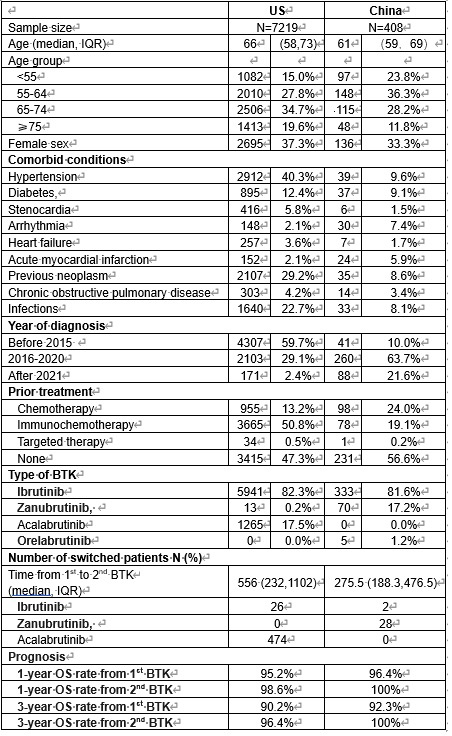Background: Bruton's tyrosine kinase (BTK) inhibitors have transformed the treatment landscape for chronic lymphocytic leukemia/small lymphocytic lymphoma (CLL/SLL). Real-world data can provide insights into factors influencing BTK inhibitor initiation and switching, enabling a comprehensive understanding of treatment patterns. This study aimed to evaluate these factors in CLL/SLL patients in the United States and Tianjin, China, and compare overall survival outcomes among patients using different BTK inhibitor types.
Methods: We conducted a comparative analysis utilizing real-world data from two sources: the Flatiron Database in the US and Tianjin Regional Healthcare Data in China. Data from both databases were analyzed to identify factors associated with BTK inhibitor initiation and switching in CLL/SLL patients. Additionally, overall survival outcomes were assessed among patients using various types of BTK inhibitors, including ibrutinib, acalabrutinib, and zanubrutinib.
Results: Our analysis revealed key differences in patient characteristics. Median age of US BTK users was 66 years (IQR: 58-73) vs. 61 years (IQR: 59-69) in China. Notably, the US exhibited higher rates of hypertension (40.3% vs. 9.6%), diabetes (12.4% vs, 9.1%) and infections (22.1% vs. 8.1%). BTK treatment utilization differed between the US and China: Ibrutinib 82.3% vs. 81.6%; Zanubrutinib 0.2% vs. 17.2%; and Acalabrutinib 17.5% vs. 0%.
A higher proportion of US BTK users were exposed to immunochemotherapy (50.8% vs. 19.1%). Overall survival rates at 1-year and 3-years from 1 st BTK were comparable (US 95.2% vs. China 96.4%; US 90.2% vs. China 92.3%); and from 2 nd BTK (US 98.6% vs. China 100%, US 96.4% vs. China 100%).
Conclusion: This study contributes to a comprehensive understanding of real-world BTK inhibitor initiation and switching in CLL/SLL patients from the United States and Tianjin, China. Additionally, the 1-year and 3-year OS rates from both 1st and 2nd BTK treatments were generally favorable in both regions, suggesting the effectiveness of BTK therapies in B-cell malignancies. These findings have implications for treatment decision-making and optimizing patient care in CLL/SLL.
Disclosures
No relevant conflicts of interest to declare.


This feature is available to Subscribers Only
Sign In or Create an Account Close Modal